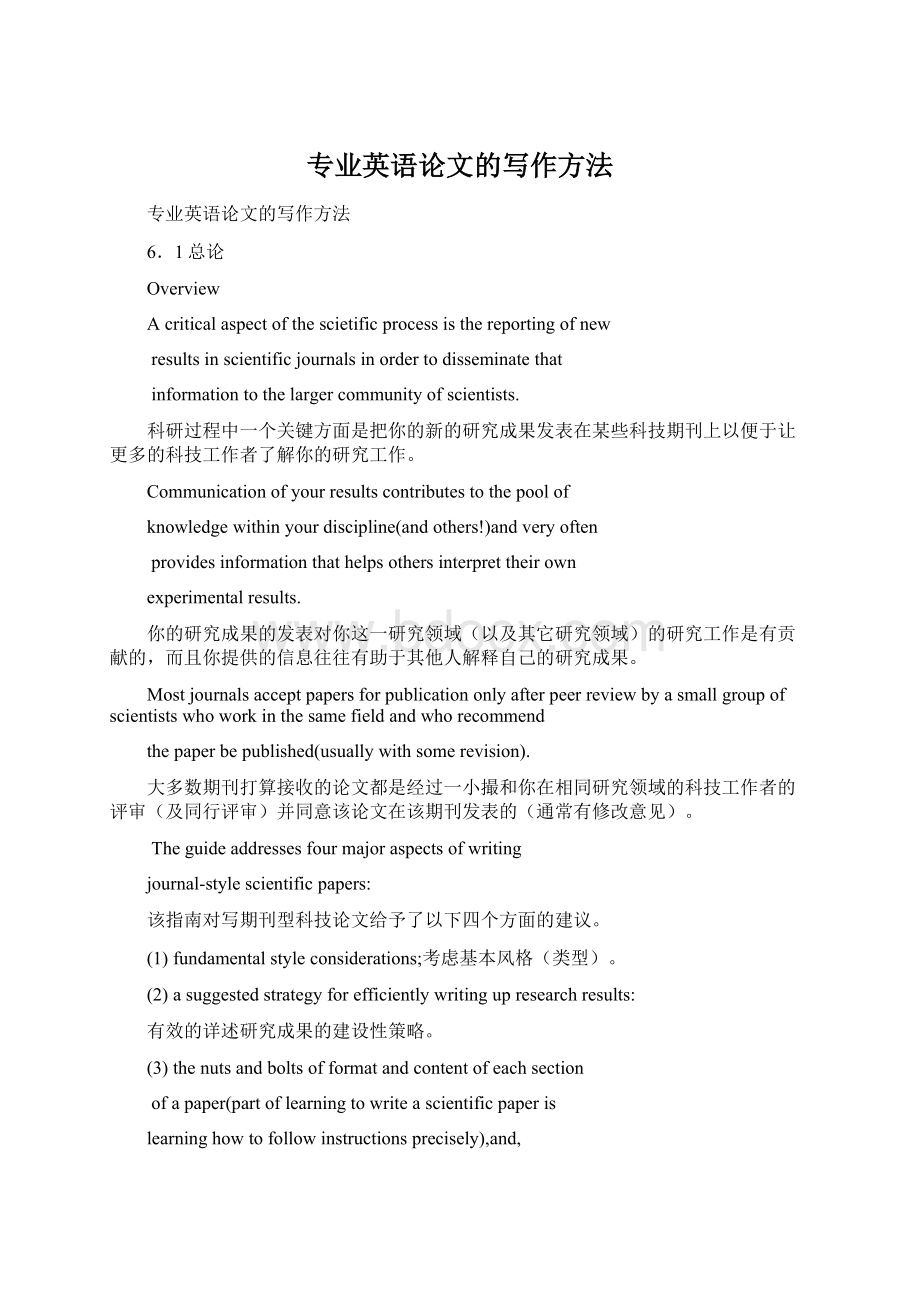专业英语论文的写作方法.docx
《专业英语论文的写作方法.docx》由会员分享,可在线阅读,更多相关《专业英语论文的写作方法.docx(11页珍藏版)》请在冰豆网上搜索。

专业英语论文的写作方法
专业英语论文的写作方法
6.1总论
Overview
Acriticalaspectofthescietificprocessisthereportingofnew
resultsinscientificjournalsinordertodisseminatethat
informationtothelargercommunityofscientists.
科研过程中一个关键方面是把你的新的研究成果发表在某些科技期刊上以便于让更多的科技工作者了解你的研究工作。
Communicationofyourresultscontributestothepoolof
knowledgewithinyourdiscipline(andothers!
)andveryoften
providesinformationthathelpsothersinterprettheirown
experimentalresults.
你的研究成果的发表对你这一研究领域(以及其它研究领域)的研究工作是有贡献的,而且你提供的信息往往有助于其他人解释自己的研究成果。
Mostjournalsacceptpapersforpublicationonlyafterpeerreviewbyasmallgroupofscientistswhoworkinthesamefieldandwhorecommend
thepaperbepublished(usuallywithsomerevision).
大多数期刊打算接收的论文都是经过一小撮和你在相同研究领域的科技工作者的评审(及同行评审)并同意该论文在该期刊发表的(通常有修改意见)。
Theguideaddressesfourmajoraspectsofwriting
journal-stylescientificpapers:
该指南对写期刊型科技论文给予了以下四个方面的建议。
(1)fundamentalstyleconsiderations;考虑基本风格(类型)。
(2)asuggestedstrategyforefficientlywritingupresearchresults:
有效的详述研究成果的建设性策略。
(3)thenutsandboltsofformatandcontentofeachsection
ofapaper(partoflearningtowriteascientificpaperis
learninghowtofollowinstructionsprecisely),and,
知道该论文每一节的格式和内容的基本情况(我们学写一篇科技论文的一方面是学会如何严格遵守指南(说明)。
(4)basicinformationregardingpeercritiquesofscientificwriting.
知道关于科技写作中同行评论的基本内容。
Alljournalshaveasetofinstructionsforauthorswhich
explicitlystatehowtheirpapershouldbeformattedfor
submission.
所有的期刊都有一套适合作者的说明须知,它详述了论文提交时应具有什么样的格式。
Considerthisguidetobeyourinstructionswhen
writingyourpapers.
把该指南作为你写论文的用法指导。
Weencourageyoutofollowthedirections
carefullyandtomakefulluseofthisguideasprepare
yourpapers.
我们鼓励你严格遵守指导(用法说明)并在写论文时充分利用该指南。
Pleaseaskforhelpifyouhavequestionsaboutformat,style.orcontent.
若你对格式,风格及内容有什么问题请寻求帮助。
Aboveall,remembertowritewithprecision,clarity,andeconomy.
首要的是,写论文时本着准确、清晰和简洁的原则。
GettingStarted
Thefirsttasktoaccomplishasyoubegintheprocessof
writingistoorderandorganizetheinformation
youwishtopresent.
写论文时首先要整理和组织你想要表达的内容。
Somepeopleworkwellfromanoutline,othersdonot,.
有些人善于从梗概着手,而有些人不这样。
Somepepolewritefirsttodiscoverthe
points,thenrearrangethemusingafter-the-factoutline.
有些人先找出文章的关键点,然后根据事后的梗概重新整理(重排)这些关键点。
Whateverprocessyoumayuse,beawarethatscientific
writingrequiresspecialattentiontoorderandorganization
无论你用什么方法,必须注意(你要意识到)对内容的整理和组织要给予特殊注意。
Becausethepaperwillbedevidedintosections,youneed
toknowwhatinformationwillgointoeach.
因为论文将会被分为多节,你需要知道哪些内容是在哪一节里。
Ifyoudon′tnormallyworkfromanoutline,
thismaybeanoccasionwhenyou′llatleastwanttodevelop
alistofthemajorpointstobeincludedineach
若你通常不从梗概着手,这或许是个机会,那么在你开始写论文时至少要列一张该论文每节所包含的关键点的单子。
beforeyoubegintowrite.Ifthepaperhas
multipleauthors,thenthisisagoodtimeto
work(andnegotiate!
)withyourcollaboratorsto
insurethatallthepointsthegroupwantsto
makegetlisted.若该论文有多个作者,这是与你的合作者们协商的好机会,以确保你们想要表达的内容都在这个清单上了。
Yourwritingshouldbeincompletesentencesand
easilyunderstood.
写作时应用完整的且容易被理解的句子
ItshouldconformtotheconventionsofstandardwrittenEnglish(sentencesform,grammar,spelling,etc).
论文应遵守常规的书面语格式(句子形式、语法及拼写等方面)。
Yourideaswillhavelittleimpact,nomatterhowgoodthe
research,iftheyarenotcommunicatedwell.
无论你的研究成果有多么出色,写论文时不要带主观色彩,即使你表达的不够尽善尽美。
Rememberalwaysthatscientificterminologyvery
oftenhasprecisemeaning.
往往要记住的是科技术语通常会有准确的意思。
Becertainyouchooseyourwordscorrectlyandwisely.
确定你能正确而智慧的选择用词。
Itisimportandtowriteclearlyandconcisely.
清晰而简洁的表达是重要的。
Makesurethateveryparagraphhasacleartopic
sentenceandthattheparagraphcontentsupportsthetopic.
确保每一段有一个清晰的主题句,而且该段内容都围绕着该主题展开。
Thegoalistoreportyourfindingsandconclusionsclearly,andwithasfewwordsasnecessary.
写论文的目的是清晰的报告你的研究结果和结论,所以用尽可能少的词汇(表达更多的内容)。
Youraudience(otherscientistsusually)arenotinterestedinflowery prose,theywanttoknowyourfindings.
读者(通常是其他科技工作者)对你的那些华丽的辞藻并不感兴趣,他们想要了解大是你的研究结果。
StyleConsiderations
Beclearandconcise:
Writebrieflyandtothepoint.
清晰且简洁:
内容简短并直指关键。
Saywhatyoumeanclearlyandavoidembellishment
withunnecessarywordsorphrases.Brevityis
veryimportant.清晰的表达你要表达的内容,避免用不必要的词汇及短语修饰。
简短是很重要的。
Useoftheactivevoicealoneshortenssentence
lengthconsiderably.单独用主动语态会大大缩短句子的长度。
Preciseworduseiscritical:
Scientificterminology
carriesspecificmeaning-learntouseitappropriate
lyanduseitconsistently.
准确用词是关键的:
科技术语承载着具体含义—学会适当的使用并要坚持使用。
Acriticalfunctionoftechnicalterminologyistosayalotwithafewwords,i.e.,economy.
科技术语的关键作用的用很少的词汇表达教多的内容,即简洁。
Thisappliesaswell toappropriateacronymsandabbreviations.
这也适用于适当的缩写词。
Directyourpapertowardtheaveragereader
inyourintendedaudience.
你论文的难易程度要居于你的目标读者的平均水平线上。
Ifwritingforahighlytechnicaljournal,youwillnecessarilyusethetechnicaljargon.
若你的论文是打算投稿于高水平的科技期刊,你用一些行话(难懂的话)。
Ifwritingforageneralscience audienceyouwouldlimitthejargon.若你的论文只为普通科技读者阅读,少用行话。
Somethingstoavoid:
有些情况需要避免:
Youdonothavetotrytoimpresspeoplebyusing
wordsmostpeoplehaveneverheardof.
你不必使用那些大多数人从来没有听说过的词汇而加深读者的印象的手段。
Manypublishedarticlesarelikethis,
andtheyarepoorpapersonaccountofit.
许多已发表的
Donotusecolloquialspeech,slang,or“childish’
wordsorphrases.
不要用口语,俚语及儿话。
Donotusecontractions:
forexample,don′tmust
be“donot”and“isn′t”mustbe“isnot”etc.
不要用缩写词:
例如,don′t必须写为donot,isn′t必须写为isnot等。
Abbreviations:
Donotuseabbreviationsinthetext
exceptforunitsofmeasure.缩写词:
除了度量单位不要在文中使用缩写词
Alwaysabbreviatethesewhenusingthemwithdata
(2mm;10min.).当度量单位带上数据时往往以缩写的形式出现。
Exceptfortemperatrueunits(F,C,K)
neverabbreviateunitsofmeasurewhenusingthem
inanon-datacontext(e.g.,”wemeasruedlength
inmillimeters”;”timewasrecorder
inminutes”;”termperaturewasmeasuredinF(orC)
usePastTense:
Researchpapersreflectworkthathas
beencompleted,thereforeusethepasttense
throughoutyourpaper(includingtheIntroduction)
whenreferringtotheactualworkthatyoudid,
includingstatementsaboutyourexpectationsor
hypotheses.Usethepasttense,aswell,when
referringtotheworkofothersthatyoumaycite
Firstvs.ThirdPerson:
Ifthereisonestylisic
areawherescientificdisciplinesandjournals
varywidely,itistheuseoffirstvs.third
personconstructions.
Firstvs.ThirdPerson:
IFthereisonestylisticareawhere
scientificdisciplinesandjournalsvarywidely,itistheuseoffirstvs.thirdpersonconstructions.
若某期刊包含了各学科且期刊风格多样,那么论文既可用第一人称也可用第三人称。
Somedisciplinesandtheirjournalshavemovedawayfromaverystrictadherencetothethirdpersonconstruction,andpermitlimiteduseofthefirstpersoninpublishedpapers.
某些学科及其期刊不再严格使用第一人称,即允许在发表的论文中少量的使用第一人称。
Otherdisciplines,especiallythebiomedicalfields,stillpreferthethirdpersonconstrcution.
其它的一些学科,尤其是生物医学领域,仍坚持使用第三人称。
Limitouruseoffirstpersonconstruction
我们要限制性的使用第一人称。
(“i.e.,”I(orwe)undertookthisstudy……):
usuallyitismostacceptableintheIntroductionandDiscussionsections,andthenonlytoalimited
extent.(即,我(或我们)从事此研究):
通常在引言及讨论部分更易被接受,且也是在一定程度上的。
Usefirstpersoninthemethodssparingly,andavoiditsuseintheresults.
在方法这节里也可少量的使用第一人称,而在结果这节中避免使用。
UseActiveVerbs:
Useactiveverbswhenever
Possible;writingthatoverlyusespassive
verbs(is,was,has,have,had)isdeadlytoreadand
almostalwaysresultsinmorewordsthannecessary
tosaythesamething.
使用主动动词:
尽可能的使用主动动词;过量的使用被动动词会是论文晦涩,而且几乎往往叙述同一件事用了更多的词。
Theclarityandeffectivenessofyourwriting
willimprovedramaticallyasyouincreasetheuse
oftheactivevoice.
当你加大使用主动语态的频率时,所写论文将更清晰、更简洁。
Otherspecificcommentsonstylearealso
includedforeachsectionofthepaper.
关于论文文体方面的其它具体的评述也都包含在它的每节中。
Remember:
preciseworduse,pasttense,activevoice,brevity.
记住:
用词准确,用过去时,用主动语态且用词要简洁。
Referencestotheresearchfindingsofothers
areanintegralcomponentofanyresearch
paper.
参考其他人的研究结果在任何科研论文中都必不可少。
Theusualpracticeistosummarizethe
findingorotherinformationinyourownwords
andthencitethesourse.
通常的做法是用你自己的话概括他的研究结果及其他信息并说明出处。
Anyideasorotherinformationthatarenotyourownmustbesubstantiatedbyareferencethatiscitedinthetext.
任何不是你自己的想法和内容都必须用附在文中的参考文献所证明。
Asarule,inresearchpapers,directquotationandfootnotingarenotpracticed-simplyrestatetheauthor′sideasorfindingsinyourownwordsandprovideacitation.
……
通常,在科研论文中,直接引证和脚注都不可取—用你自己的话简要的复述引文的观点和研究结果并提供出处。
WhyaScientificFormat?
为什么论文要有精确的格式?
Thescientificformatmayseemconfusingforthe
beginningsciencewriterduetoitsrigidstructure
whichissodifferentfromwritinginthehumanities.
由于科技论文具有严格的结构,这似乎使初涉科技论文写作的人茫然,而文学写作则不然。
Onereasonforusingthisformatisthatitisameansofefficientlycommunicatingscientificfindingstothebroadcommunityofscientistsinauniformmanner.
原因之一是使用这种严格的格式可有效的用统一的方法将科研成果告知广泛的科研工作者。
Anotherreason,perhapsmoreimportantthanthe
first,isthatthisformatallowsthepaper
tobereadatseveraldifferentlevels.
另一个原因(也许比第一个原因更重要)是该标准格式可使科研工作者不同程度的阅读你的论文。
Forexample,
manypeopleskimTitlestofindoutwhat
informationisavailableonasubject.Othersmayread
onlytitlesandAbstracts.Thosewantingtogo
deepermaylookattheTablesandFiguresinthe
Results,andsoon.
例如:
许多人只是浏览一下题目以便于发现该主题是否可用。
而另一些人仅仅阅读题目和摘要。
而那些想要深入阅读的人会看结果这一节中的表格和图表,等等。
Thetakehomepointhereisthatthescientificformathelpstoinsurethatatwhateverlevelapersonreadsyourpaper(beyondtitleskimming),theywilllikelygetthekeyresultsandconclusions.
好好想想清楚,精确的格式有助于确保